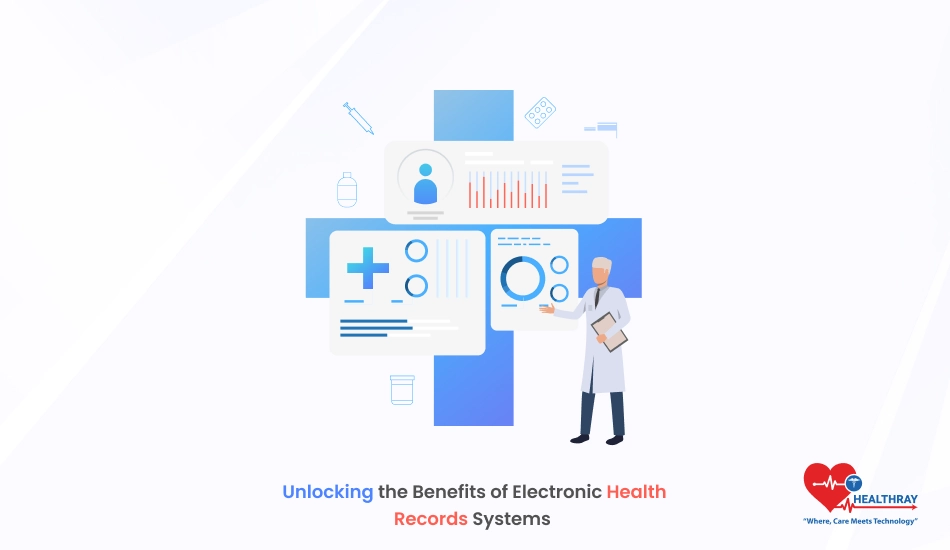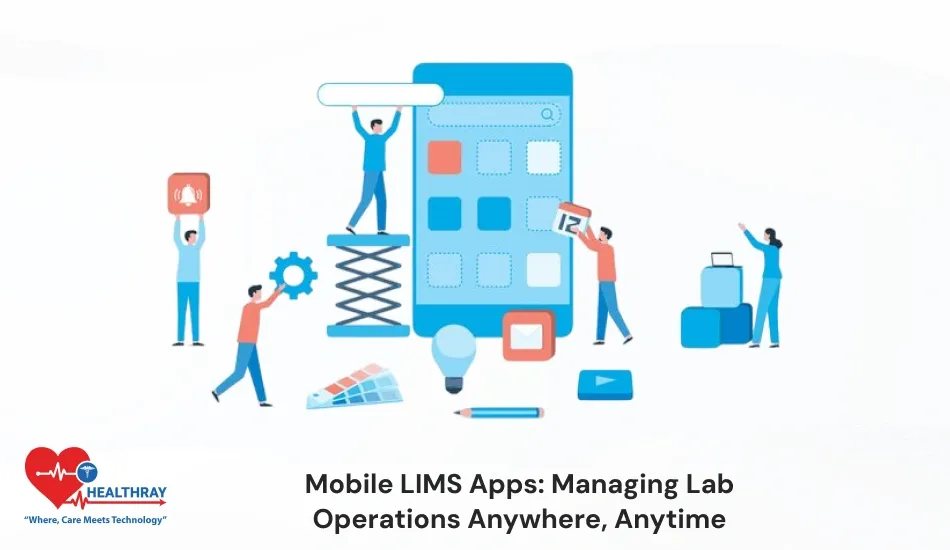Quick Summary
Electronic health records systems for improving medical delivery process, get up-to-date record of emerging cases, and predict patient cases in the future. Moreover, this system improves patient care, advances quality information, effortlessly stores an immense amount of healthcare data, reduces medical errors, and has the large potency to incorporate with medical devices. Want to learn more about the benefits of electronic health records systems? Keep an eye on the blog below.
Introduction
Implementation of electronic health records systems is the tipping point of healthcare professionals as it changes their routine activities, method of treating patients, managing interns, turning the method of storing documents, and even analyzing patient reports. Moreover, it is equally profitable for patients because it comprises patient related tools.
Furthermore, these tools can store wide details of patients including immunization reports, schedule a physician time, generating business reports, easy to administer radiology reports, coordinate with healthcare providers at any moment, hoard medical histories, and confidential details of individual patients. The electronic health records system software replaces paper work and draft documents in the e-format, which can be stored largely in numbers, modified with single hand, and simplified to transfer medical documents into other divisions.
Furthermore, it revolutionizes clinical workflow from reviewing an appointment system to create test results. Access documents from anywhere, improve coordinating efforts, and facilitate a better clinical outcome. Therefore, it minimizes errors, an efficient solution for big healthcare enterprises, and enhances healthcare services,
Adopting the electronic health records system for augment document accessibility, store images, and improve client care. Completely revolutionizing the world of healthcare infrastructure and maximizing clinical efficiency. Furthermore, it improves healthcare data, increases reliability, and augments health outcomes. Ease to convert any clinical transaction into electronic paper.
Additionally, the Healthray electronic medical record software is a secured platform through applying clinical standards and other data security techniques. This single tool is helpful for everyone who is connected with the medical field whether it is medical professional, lab researcher, laboratory assistant, pharmaceutical manager, or even government officials. Furthermore, EHR systems can revamp a medical industry, enhance clinical care, and augment patient care. This blog is about the comprehensive guide on an EHR system and mainly highlights the advantages of electronic health records.
Prominent Features of Electronic Health Records Systems
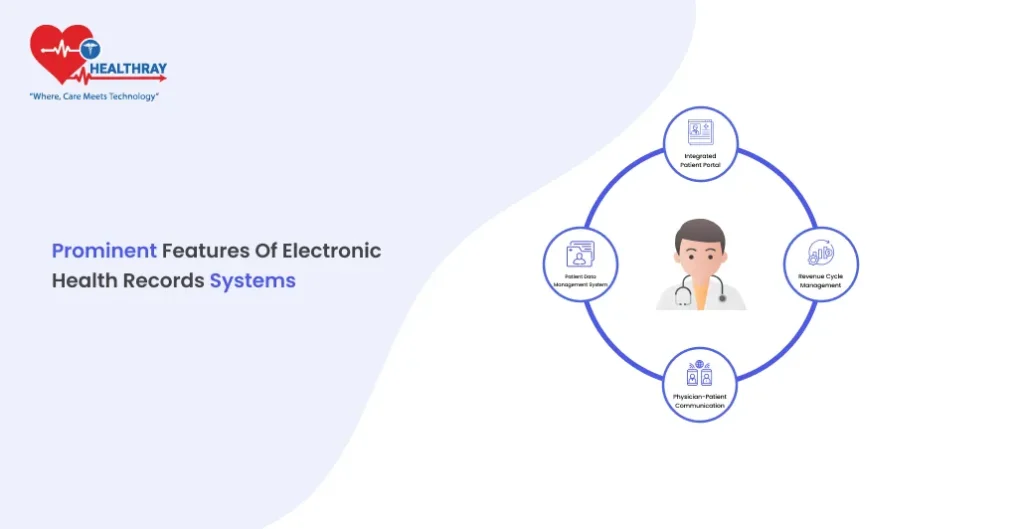
Electronic health record systems transform paper charting and improve the overall healthcare system. Moreover, it ranges from book physician timing to communicating with patients. It makes it easy to administer healthcare income, which aids to dispense salaries to healthcare employees. If you are eager to know more advantageous of electronic health record systems, take a deeper look below :
Integrated patient portal
Imagine a platform, which is available 24/7 and can allow patients to glance at their medical records and can analyze their medical condition at any time. Moreover, the EHR system helps to schedule doctor’s time and keep patient records along with medical history. It facilitates innumerable advantages such as :
- It makes easy to book doctor’s slot
- Patients can edit and update their data
- Saves considerable amount of time-period
- Merging to other medical systems
- Provide storage for medical history
Revenue cycle management
It assists in administering healthcare finance, which are mainly in large amounts and hard to handle. Moreover, the EHR software amasses finance information from patient’s payment, routine expenses, healthcare bills, hospital loans, and claim collection payment.
Administer financial operations from collecting mass payments, create clear bills, reduce claim denials, and improve revenue cycle. Ease to inspect unpaid amounts, clear out mistakes, minimize costs in performing financial activities, and mitigates frauds. Moreover, the electronic health record system designs for improving treatment services, streamlining a payment system, and administering claims appropriately.
Accurately manages organization revenue supports analyzing medical finances and draws effective decisions such as amount of investment in the healthcare infrastructure, and the percentage increment of organization employee. Additionally, the electronic medical record system (EMR system) supports making cost-effective decisions.
The electronic medical record system administers hospital income and frames advanced strategies to cut-down expenses. Furthermore, it includes insurance coverage, patient medical bills, advanced payments, and asset acquisition slips. Unpaid amounts have been detected easily, taking follow up for smooth cash flow and minimizing barriers on maintaining financial accounts.
Physician-patient communication
Patients must-have clear communication to physicians because it helps to reduce error, accurate treatment, and eliminates confusion. Moreover, EMR systems bridge the communication gap between patients and doctors.
It is the prominent key for a successful healthcare organization. Moreover, it helps to improve patient contentment and supports enhancing the patient registration numbers. Ultimately, EHR systems for hospitals improve healthcare revenue and aids to make faithful relationships with physicians.
Patient data management system
It gathers a variety of patient information in the account chart format. Furthermore, the information includes the patient’s medical history, blood pressure reports, laboratory test results, radiology images information, and personal data. Moreover, the patient data management system has incalculable benefits such as :
- Enhancing patient safety
- Make conversation private
- Improve patient’s data security
- Store historical records
- Aids to strategic decisions.
Major Advantages of Electronic Health Records Systems
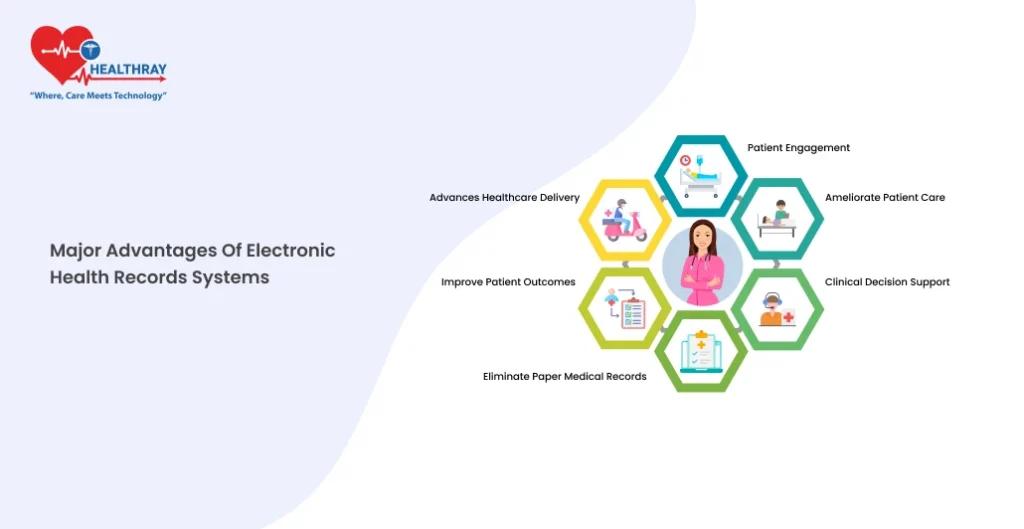
Electronic health record systems are the ultimate solution for healthcare organizations, laboratories, and pharmaceuticals. Moreover, Healthray’s EMR software can create various types of forms such as registration form, discharge form, billing forms, and more. The major advantages of electronic health records software are :
Patient Engagement
Improving patient engagement takes extensive efforts from healthcare providers, clinical staff, and hospital nurses. Also, it requires the best medical infrastructure and obviously, a great coordination with the entire healthcare staff.
This is a common objective of all health care organizations whether it is small clinics or big hospitals. Moreover, Electronic Health Records Systems assist in speedy treatment of any diseases, proper prescription, precise analysis of disease’s health, enhances patient contentment, minimizes waste, and substantially decreases overall healthcare expenses.
Ameliorate patient care
Patient care is one of the prominent benefits of electronic health records. Moreover, the electronic medical record system (EMR system) has ultimate features such as online slot booking, accumulated patient record, saving any types of medical information, viewing reports in the graphical compendium format, remote device accessibility, and aids to eloquent communication to other healthcare providers. The ameliorate patient care has been achieved through the following strategies such as :
- Having well communication with patients by entire healthcare team
- Better healthcare infrastructure
- Advance medical facilities
- Digital payment option
- Fast treatment with incurring less medical expenses.
Step towards digital era with our healthcare solution
Revamp your hospital facilities and embrace change for better healthcare management. Ease in managing and organizing large medical datasets leads to effective analysis. Seize the opportunity now!
Clinical decision support
If you want to make a strategic clinical decision, you need precise and well-informed data that can help to make accurate conclusions and immediate action against any healthcare challenge. Moreover, the precise decision aids to treat patients early and aids to reduce medical costs. This seems difficult but it is easily possible with the electronic medical record.
The electronic health record has included several components, which assist in accurate clinical decisions such as intelligence reports, garner health data, automated systems, and patient portals. Furthermore, Electronic Health Records Systems improve healthcare efficiency through saving enlarged time, medical resources and costs of a medical organization.
Advances healthcare delivery
Revamp medical services from booking time to produce business reports. Moreover, everything is advanced nowadays, so why not healthcare providers? Implementing electronic health record (EHR) facilitates modern health information technology, which modifies the entire hospital system.
Electronic medical records encompasses unique tools such as patient record management, automated intelligence report, instant notify through SMS or notification, remote health monitoring, and tele-consultation. Additionally, Healthray’s EMR software aids to have an articulate communication to medical practitioners.
Improve patient outcomes
This is not easy to accomplish as it requires a team effort and modern technologies to precise diagnosis of patients. Moreover, it can be achieved through lower medical mistakes, team effort, enhancing document safety, simplifying to maintain severe disease, and educating patients. The advantages of improving patient outcomes are :
- Escalating patient satisfaction
- Enhances the reputation of healthcare organization
- Aids to improve cash flow
- Heightens employee contentment
- Improving turnover rate
Eliminate paper medical records
The EHR adoption superseded the paper record system and makes it easy to do any healthcare tasks. Moreover, this software helps to maintain precise information, which means no errors and organized health data in the better format. Therefore, it provides the system eco-friendly and makes it easy to transmit files to any individual.
Most importantly, it reduces the healthcare costs as this software nil the procurement expenses on paper, stamp, printing and transportation charges. Moreover, the top EHR software like Healthray, which has ultimate digital functionalities and modern tools for intensifying patient care and improves retention rate of patients in the healthcare organization.
The Impact of an Electronic Health Record on Healthcare Providers
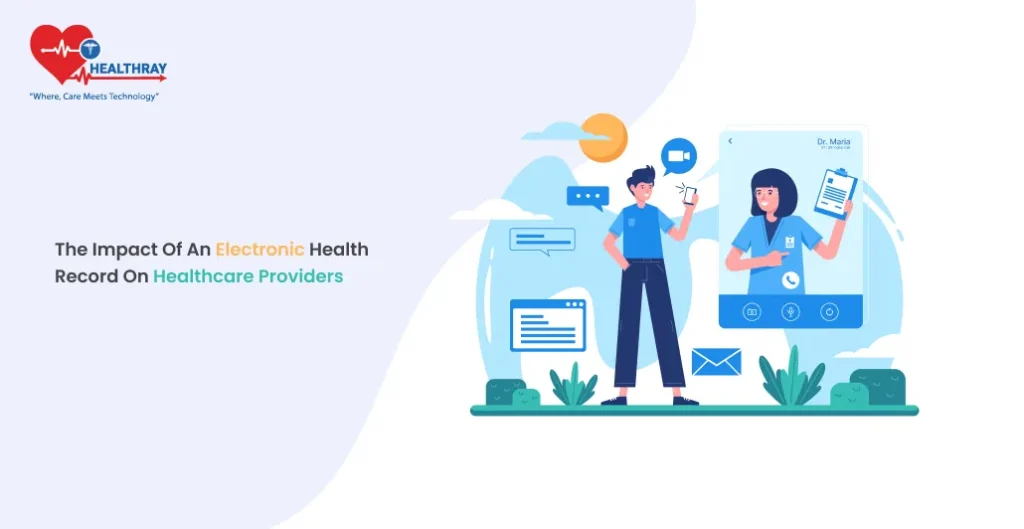
AI implications in healthcare reduces the complexity of medical procedure, accurate treatment of patients, and assisting health care professionals to practice solely without investing any additional funds. Additionally, the electronic health record system mitigates patients costs on transportation, eliminates waiting hours, facilitates reliable data, and virtual medical consultation.
Electronic health records systems reduce the cost of managing healthcare space and maintain privacy of all entered documents. Moreover, it simplifies the medical work of the healthcare industry. This computer system facilitates the maintenance of routine care activities whether it is slot booking or having meetings with junior health practitioners.
It supports effective teamwork and attaining the objective faster. Moreover, it simplifies to store prescriptions digitally with their past records, mitigates no shows, and aids in effective patient care. Additionally, the electronic medical record system (EMR system) helps healthcare providers to easily coordinate with other medical practitioners and a great chance for them to increase income. Consequently, Electronic health records systems amplify medical services, and improve their presence on digital media.
Conclusion
Electronic health records systems are marvelous substitutes for paper charts. Moreover, it has various prominent features such as integrated patient portal, revenue cycle management, physician-patient communication, and patient data management system. Furthermore, this software has major benefits such as patient engagement, ameliorate patient care, clinical decision support, advanced healthcare delivery, improved patient outcomes, and eliminating paper medical records. Additionally, health care providers have immense support to enhance revenue and simplify medical work tasks.
